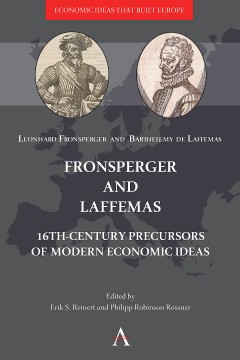Fronsperger and Laffemas
16th-century Precursors of Modern Economic Ideas
By Leonhard Fronsperger & Barthélemy de Laffemas
Edited by Erik S. Reinert & Philipp Robinson Rössner
Other Formats Available:
- About This Book
- Reviews
- Author Information
- Series
- Table of Contents
- Links
- Podcasts
About This Book
This volume introduces two unique and hitherto largely unknown contributions published in the 1500s to the making of modern economic knowledge, making them available internationally for the first time in full English translation.
- Written in 1597, Barthélemy de Laffemas’ General regulation for the establishment of manufactures (written originally in French: Reiglement général pour dresser les manufactures) represents one of the earliest voices in the history of political economy – together with Italian economists Giovanni Botero (1589) and Antonio Serra (1613) – arguing that manufacturing and industry are the true sources of the wealth of nations and that states
should pursue an active industrial policy. Located at the crossroads between medieval Scholasticism and early mercantilism, it presents a political program that would lead to French economic development, providing the foundations for the French industrialization program during the 1660s-1680s. Laffemas presents a simplified version of an infant industry argument and European standard model of economic development known from thoughts of Enlightenment thinkers such as Colbert, Sir James Steuart, Friedrich List’s National System of Political Economy (1841), nineteenth and twentieth-century theories for catching up with England and later the US, and the ‘industrial policy’ or recently ‘mission-driven’ policies (Mariana Mazzucato).
- Leonhard Fronsperger’s On the praise of self-interest (German original: Von dem Lob deß Eigen Nutzen, 1564) is the first documented instance of the ‘Mandeville paradox’, one of the key axioms of neoliberalism. Commonly associated with much later writings, including Bernard de Mandeville’s Fable of the Bees (1705/14), and Adam Smith’s Wealth of Nations (1776), German military surgeon and polymath Fronsperger argued in 1564 that self-interest is an important driver in economic development. In his text, however, Fronsperger is much more pragmatic and less ideological than Mandeville or post-Mandevillean modern neoliberals. Vested in Renaissance Humanism and directly associated with the master of his time – Erasmus of Rotterdam – Fronsperger develops Renaissance theory about homo faber (creative, driven humans) as the center of the world to perfection, deriving from it the logical conclusion that possessive individualism and self-interest are important forces moving the human economy forward. Without letting go of the state, this work argues for self-interest facilitating virtuous cycles of enrichment and positive economic development.
Reviews
“The history of economics has famously been dubbed ‘the wrong opinions of dead men’. This handsome little book with translations of texts by Leonhard Fronsperger (1564) and Barthélemy de Laffemas (1597) plus valuable classifications by editors and commentators shows how wrong this view is – an expression of provincialism of time.” — Professor em. Dr. Dr. h.c. Heinz D. Kurz, Department of Economics and Graz Schumpeter Centre, University of Graz, Austria.
“Reinert and Rössner provide us once again with important perspectives on ‘pre-classic’ European economic thought with relevance to modern-day issues. Their book offers translated works by 16th-century economists Laffemas and Fronsperger, enhancing our understanding of economic theory and policy. No chatbot can yet replace such a valuable and unique contribution.” —Wolfgang Drechsler, Professor of Governance at TalTech’s Ragnar Nurkse, Department of Innovation and Governance, Honorary Professor of University College London in the Institute for Innovation and Public Purpose, and Associate and Member of the Advisory Board at Harvard University’s Davis Center for Russian and Eurasian Studies.
“This collection makes available, for the first time in English translation, texts by the German Leonhard Fronsperger and the Frenchman Barthélemy Laffemas. Already in Fronsperger’s Praise of Self-Interest (1564), we see arguments that would emerge later in works by Pierre Nicole and Bernard Mandeville, who are frequently credited with laying the basis of political economy in arguments of moral philosophy. In Laffemas’s General Regulation for the Establishment of Manufactures (1597), we see how, at its origin, political economy was conceived of as a new system of governance intended to pacify early modern societies and states in almost perpetual conflict. Taken together, these make a persuasive argument that the late Renaissance deserves more attention, and this valuable edition will help to catalyse more work on this period in the history of political economy.” — Paul Cheney, Professor of European History, University of Chicago.
“Lately there has been an increased interest in past economic thought that goes beyond the standard interpretation of doctrinal developments from the 16th century up to emergence of the Smithian revolution in the 18th century. This book concentrating on the 16th century tries to present and put into historical context two early economists, the French Barthélemy de Laffemas and the German Leonhard Fronsperger. Presented with a newly written foreword by Erik S Reinert included original texts for the first time translated to English this volume present a fresh and challenging starting-point for understanding early continental economics in its own terms before the emergence of modern economics.” —Lars Magnusson, Dept of Economic History, Uppsala University, Sweden.
Author Information
Erik S. Reinert is a Professor of Technology Governance and Development Strategies, at Tallinn University of Technology. He is also Honorary Professor at theInstitute for Innovation and Public Purpose, University College London.
Philipp Robinson Rössner is a Professor (chair) of Early Modern History, The University of Manchester.
Series
Economic Ideas that Built Europe
Anthem Other Canon Economics
Table of Contents
Introduction; 1 Barthélemy de Laffemas (1545–ca. 1611) as an Early Economist: Context and Scholarly Voices in the English-language Literature, Erik S. Reinert and Philipp Robinson Rössner; 2 General Regulation for the Establishment of Manufactures (1597), Barthélemy de Laffemas Translated from the original French by Philip Stewart; 3 Leonhard Fronsperger (1520–ca. 1575) as an Early Apology of the Market Economy, Rainer Klump and Lars Pilz; 4 Leonhard Fronsperger ‘On the Praise of Self-Interest’ (1564), Translated from the original Early New High German by Philipp Robinson Rössner with Julia McLachlan
Links
Stay Updated
Information
Latest Tweets



